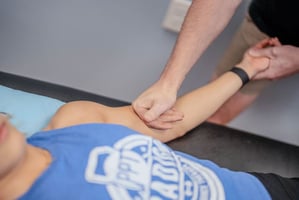Traditional physical therapy has long been the standard approach to treating injuries, managing...
Managing Triathlon Injuries: Tips for Staying Injury-Free and Active

Triathlons are one of the most demanding sports, requiring endurance in three different disciplines: swimming, cycling, and running. This mix of activities puts significant stress on the body, making it prone to injury throughout the race season. As athletes, we know we can’t completely prevent injuries, but by understanding common risks and taking proper precautions, we can reduce the likelihood of injury and recover better when they happen.
At Paradigm Performance Therapy in Wilmington, NC, we specialize in sports physical therapy to help athletes, especially triathletes and runners, maintain peak performance and prevent injury. Whether you’re training for a sprint, Olympic, or Ironman triathlon, understanding how your body reacts to the rigors of the sport is key to long-term success.
Common Injuries in Triathlons
Most injuries in triathlon come from overuse. A study found that 78% of triathletes suffer from overuse injuries, compared to only 22% from acute injuries. Among the three disciplines, running is the most likely to cause injury. Physical therapy for runners is crucial, as running puts
significant strain on the lower body, particularly the knees, feet, and ankles. Studies show that 58% to 72% of triathletes experience running-related injuries.
In comparison, cycling accounts for 15% to 20% of injuries, often leading to low back pain from extended time in the aero position. Swimming, while having the lowest injury rate (5% to 10%), can still cause shoulder problems due to the repetitive motion required in the water.
How to Reduce Your Risk
Planning is essential. Whether you follow a structured training program or work with a coach, gradual progression in your workouts can help prevent overuse injuries. If you train too hard or skip rest and recovery periods, you increase your chances of getting injured. At Paradigm, we
recommend a personalized approach to training that includes strength-building, mobility work, and time for recovery.
Warm-ups are also critical. Dynamic warm-ups—like leg swings, skips, arm circles, and squats—get the body ready for activity. Static stretches, such as holding a calf or hamstring stretch for 30 seconds, may actually decrease performance if done immediately before a workout. Keep your warm-ups dynamic and spend about 10 to 15 minutes getting your body prepped.
Recovering from Injuries
Triathletes with a history of previous injuries are at greater risk of re-injury. Higher preseason running mileage can also be a factor. If pain is severe enough that it stops you from completing your workout or leaves you sore for days, it’s time to seek professional help.
At Paradigm Performance Therapy, we offer sports therapy tailored to triathletes. Whether you’re dealing with knee pain, Achilles issues, or shoulder injuries, our team can identify muscle imbalances and weaknesses that contribute to injury. We take a holistic approach, focusing not just on treating symptoms but addressing the root causes of your pain.
When to See a Sports Physical Therapist
If an injury keeps you from finishing a workout or training consistently, it's essential to consult a sports physical therapist. We can assess your range of motion, strength, and movement patterns to develop a treatment plan. Often, recovery doesn’t mean stopping all activities. For example, if running hurts your knee but swimming feels fine, we can help adjust your training plan so you can stay active without making the injury worse.
At Paradigm Performance Therapy in Wilmington, NC, we understand the unique demands of triathlon. Our physical therapy for runners and triathletes is designed to get you back on track quickly, using specialized treatments like dry needling and mobility work. Don't let injuries keep you from your goals—schedule a session with one of our sports physical therapists today and get the expert care you need to stay at the top of your game.
Contact Paradigm Performance Therapy today to schedule your consultation and keep performing at your best all season long.

.jpeg?height=200&name=woman-training-her-back-with-a-pec-deck-machine-2024-01-05-20-46-18-utc%20(1).jpeg)


